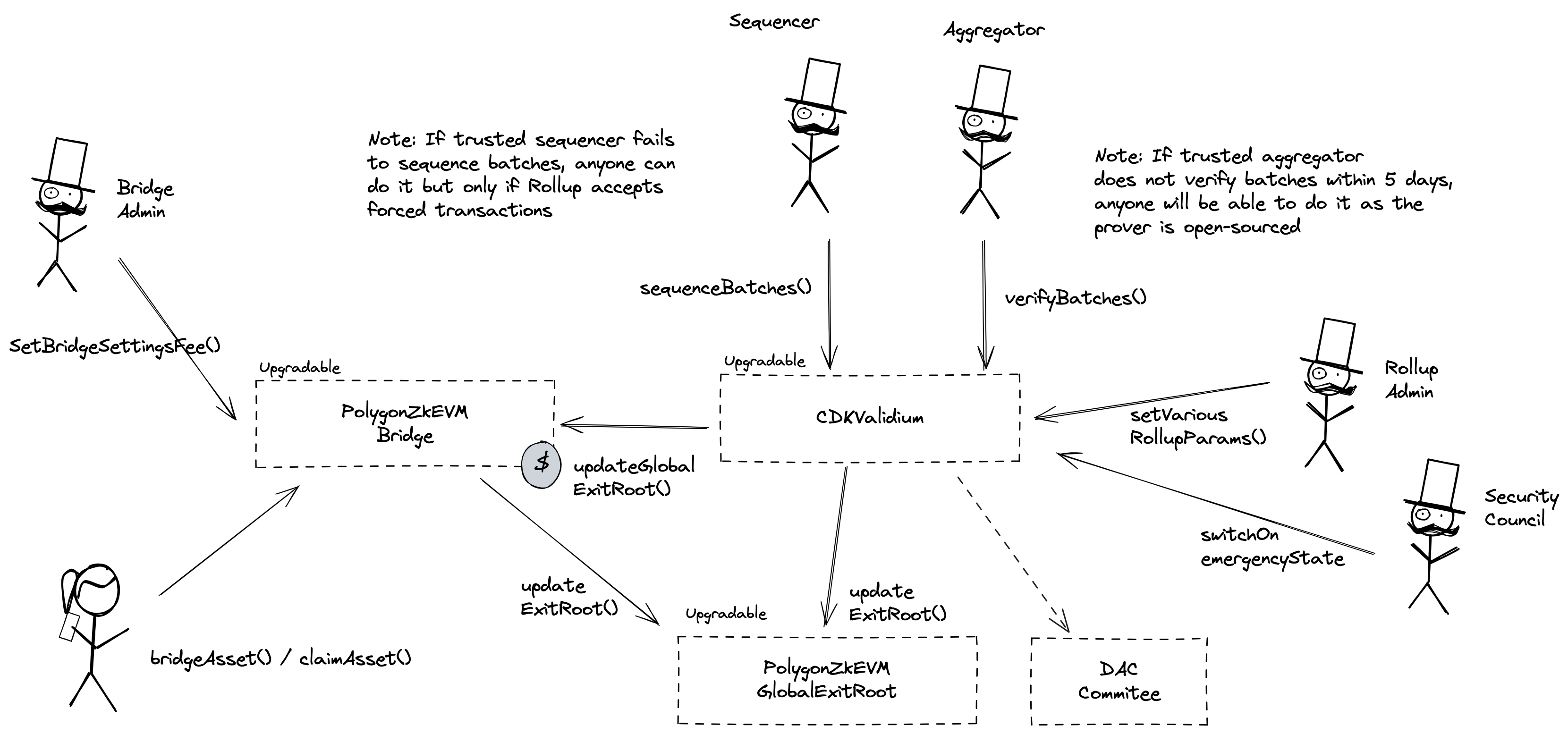 ZKFair
ZKFair
Badges
About
ZKFair is a Validium based on Polygon CDK and Celestia DA.
Badges
About
ZKFair is a Validium based on Polygon CDK and Celestia DA.
Funds can be stolen if
Funds can be lost if
Funds can be frozen if
Users can be censored if
MEV can be extracted if
Sequencer failure
No mechanismThere is no mechanism to have transactions be included if the sequencer is down or censoring. Although the functionality exists in the code, it is currently disabled.
State validation
ZK proofs (SN)SNARKs are zero knowledge proofs that ensure state correctness, but require trusted setup.
Data availability
External (DAC)Proof construction relies fully on data that is NOT published onchain. There exists a Data Availability Committee (DAC) with a threshold of 3/5 that is tasked with protecting and supplying the data.
Exit window
NoneEven though there is a 1d Timelock for upgrades, forced transactions are disabled. Even if they were to be enabled, user withdrawals can be censored up to 15d.
Validity proofs ensure state correctness
Each update to the system state must be accompanied by a ZK proof that ensures that the new state was derived by correctly applying a series of valid user transactions to the previous state. These proofs are then verified on Ethereum by a smart contract.
Data is not stored on chain
The transaction data is not recorded on the Ethereum main chain.
Funds can be lost if the external data becomes unavailable (CRITICAL).
The system has a centralized sequencer
Only a trusted sequencer is allowed to submit transaction batches. A mechanism for users to submit their own batches is currently disabled.
MEV can be extracted if the operator exploits their centralized position and frontruns user transactions.
Funds can be frozen if the sequencer refuses to include an exit transaction (CRITICAL).
Users can't force any transaction
The mechanism for allowing users to submit their own transactions is currently disabled.
Users can be censored if the operator refuses to include their transactions.
Regular exit
The system uses the following set of permissioned addresses:
Its sole purpose and ability is to submit transaction batches. In case they are unavailable users cannot rely on the force batch mechanism because it is currently disabled.
The trusted proposer (called Aggregator) provides the ZKFairValidium contract with ZK proofs of the new system state. In case they are unavailable a mechanism for users to submit proofs on their own exists, but is behind a 5d delay for proving and a 5d delay for finalizing state proven in this way. These delays can only be lowered except during the emergency state.
This is a Gnosis Safe with 3 / 4 threshold. Admin of the ZKFairValidium, can set core system parameters like timeouts, sequencer and aggregator as well as deactivate emergency state.
Those are the participants of the ZKFairAdmin.
This is a Gnosis Safe with 3 / 4 threshold. The ZkFair Owner is a multisig that can be used to trigger the emergency state which pauses bridge functionality, restricts advancing system state and removes the upgradeability delay.
Those are the participants of the ZKFairOwner.
Those are the participants of the BridgeAdminMultiSig.
Members of the Data Availability Committee. The setup is equivalent to a 3/5 multisig.
The owner of the Data Availability Committee, can update the member set at any time.
Controls the upgrades to the ZKFairValidiumDAC and ZKFairValidium contracts through the Timelock.

The system consists of the following smart contracts on the host chain (Ethereum):
The main contract of the Polygon CDK Validium. It defines the rules of the system including core system parameters, permissioned actors as well as emergency procedures. The emergency state can be activated either by the ZkFair Owner, by proving a soundness error or by presenting a sequenced batch that has not been aggregated before a 7d timeout. This contract receives transaction roots, L2 state roots as well as ZK proofs. It also holds the address of ZKFairValidiumDAC.
Upgrade delay: None
The escrow contract for user funds. It is mirrored on the L2 side and can be used to transfer ERC20 assets. To transfer funds a user initiated transaction on both sides is required. This contract can store any token.
Upgrade delay: None
An autogenerated contract that verifies ZK proofs in the ZKFairValidium system.
Committee attesting that data for a given dataRoot has been published. The DAC Owner can update the member set at any time.
Upgrade delay: None
Contract upgrades have to go through a 1d timelock unless the Emergency State is activated. It is controlled by the TimelockExecutor.
Value Locked is calculated based on these smart contracts and tokens:
The current deployment carries some associated risks:
Funds can be stolen if a contract receives a malicious code upgrade. There is a 1d delay on code upgrades.